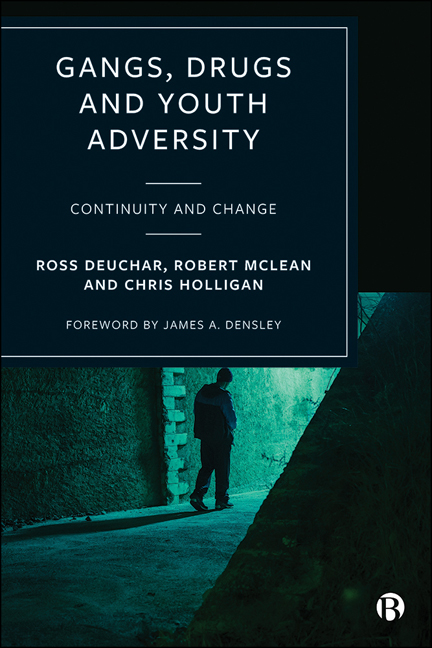Book contents
4 - Moving In, Moving Up and Moving On: Reflections of Adults and Former Gang Members
Published online by Cambridge University Press: 13 May 2022
Summary
Building on the initial insights from practitioners outlined in the last chapter, in this chapter we share the perspectives of adult members of communities in the west of Scotland who participated in our fieldwork, most of whom were former gang members and some of whom were now working as practitioners. We share the interviewees’ recollections of lived experiences in the housing schemes at a time when territorial gang violence was particularly pronounced, and the factors that enabled them to transition, change and desist. We also share their viewpoints that suggested (like those outlined in the previous chapter) that, as territorial street gang violence has continued to decline in the west of Scotland, other pressing issues – most prominently associated with drug use and drug distribution – have come to the fore.
Adults’ reflections on gangs, turning points and contemporary challenges
In the last chapter, we documented how discussions with members of our practitioner sample had drawn our attention to the changing and evolving nature of their organisations’ services in recent years. We began to uncover the contextual backdrop to this in the form of rising poverty rates, an increased prevalence of ACEs and trauma, escalating issues relating to mental ill-health, and increasing levels of drug use, drug distribution, suicide and drug-related deaths. As we referred to in Chapter 2, in our desire to explore these issues further we revisited some of Glasgow's housing schemes that had been explored by Deuchar (2009a) over a decade earlier, as well as other socially disadvantaged neighbourhoods in the west of Scotland. We were keen not only to gain insights from young people, but also adults and former gang members who had grown up in socially deprived districts and the suburbs of Glasgow and other west of Scotland towns during a period when street violence had been particularly intense (in the 1990s and early 2000s). We were interested in exploring their perceptions about how street-oriented gang culture may have changed and evolved and the wider contemporary challenges.
As we alluded to in Chapter 2, we were able to gain access to three participants from Deuchar's earlier fieldwork involving youth gang members and those who lived in gang-affected neighbourhoods.
- Type
- Chapter
- Information
- Gangs, Drugs and Youth AdversityContinuity and Change, pp. 60 - 80Publisher: Bristol University PressPrint publication year: 2021



